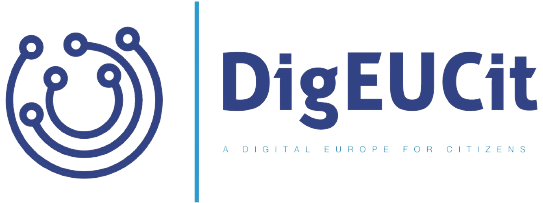
Mesmo que os jovens tenham nascido e crescido no meio de “gadgets digitais”, estando familiarizados com as plataformas e aplicações digitais e o respetivo funcionamento, a verdade é que o seu nível de literacia digital, os seus conhecimentos sobre a elaboração de políticas públicas e o quadro regulamentar da digitalização são ainda insuficientes.
O problema coloca-se, em particular, no respeitante à consciência para os desafios e riscos do mundo digital, que, apesar de conhecidos e apreendidos como riscos, são considerados de forma muitas vezes ligeira, a ponto de já se falar em paradoxos (da privacidade, da segurança)…
O projeto DigEuCit // Uma Europa Digital para os Cidadãos // Desafios constitucionais e de policymaking parte desta identificada lacuna, abordando-a com o objetivo de sensibilizar e educar para os problemas da crescente digitalização, visando, ao mesmo tempo, capacitar os seus destinatários com as competências necessárias para prevenir, evitar, responder ou mitigar os riscos de uma nova era digital.
O DigEuCit permitirá que estudantes e profissionais beneficiem plenamente de todo o potencial de uma era digital, enquanto ao mesmo tempo os prepara i) para evitar e prevenir os seus riscos, no que diz respeito à soberania digital, à inteligência artificial, à conceção de algoritmos e à desinformação, ii) para promover e melhorar adequadamente os direitos digitais do indivíduo e direitos conexos e iii) para participar no desenvolvimento e elaboração de políticas públicas, este curso é diferente de outras iniciativas, articulando-se com os objetivos da União Europeia e da Universidade do Porto.
Este projeto corresponde a um Módulo Jean Monnet e é financiado pela União Europeia através do programa Erasmus+, sendo desenvolvido na Faculdade de Direito da Universidade do Porto em interação com o Centro de Investigação Jurídica da Faculdade de Direito da Universidade do Porto (CIJ-FDUP). Permitirá também estabelecer relações com outras Faculdades e unidades orgânicas da Universidade do Porto, com a academia como um todo, bem como com stakeholders locais e nacionais e decisores políticos.
Even if the youth have born and grown amidst “digital gadgets”, being familiar with platforms and apps, the truth is that their level of digital literacy, knowledge on policymaking and the regulatory framework of the digitalisation is quite limited. In particular, as regards consciousness for the challenges and risks of a Digital world, experience tells us that, while being capable of noting some of the problems associated with it, they are treated and considered somewhat lightly.
This project departs and addresses this gap, aiming at raising awareness to the problems, while at the same time capacitating its addressees with the skills needed to prevent, avoid, answer, or mitigate the risks of a new digital era. Besides providing participants with basic knowledge on the regulatory advances in this field, the main objective of the project is help them develop the skills deemed necessary to answer all the new problems and challenges, this way helping them to accomplish their function.
In sum, allowing students and participants to fully benefit from all the potential of a digital era, while at the same time preparing them i) to avoid and prevent its risks, as regards digital sovereignty, artificial intelligence, algorithm’s design, and disinformation, ii) to properly promote and enhance individual digital and connective rights and iii) to participate in the development of public policies, this course is different from other initiatives.
The project’s management and structure is built on the continuous creation and development of scientific knowledge, not only through the organization and lecture of different courses and modules which are going to be inserted in the cycles of studies in Law, but also through constant dialogue and openness to the scientific community and civil society, according to target groups, defined septically for each event. This ‘differentiated openness’ would allow for a major participation of the society, and therefore contribute for a proper procedure of investigation and creation of results. Finally, all the results will be shared with the academia, target groups and general public, through scientific publications and media.